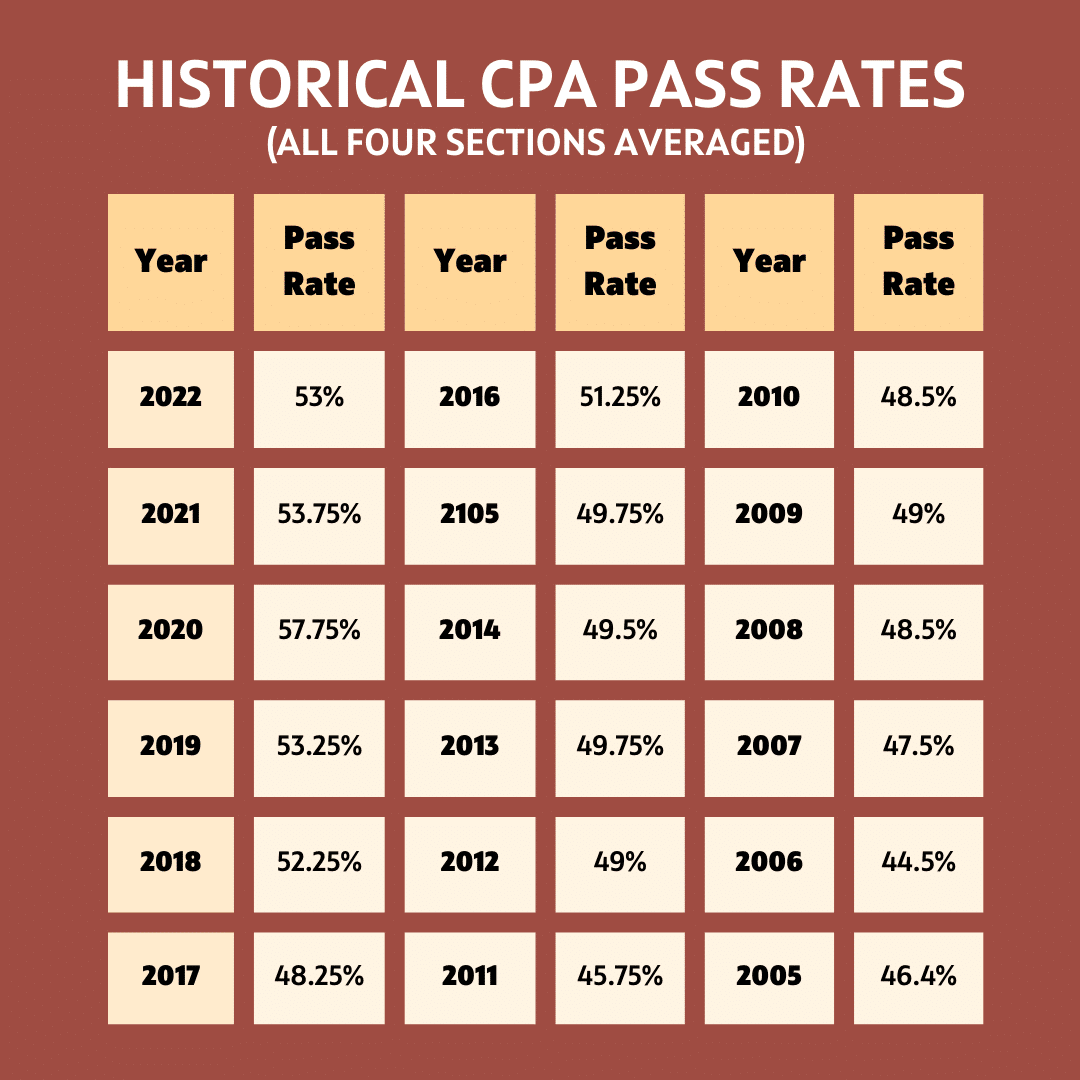The Certified Public Accountant (CPA) exam is a rigorous assessment that aspiring accountants must pass to obtain their CPA license. This comprehensive exam is designed to evaluate an individual's knowledge and skills in various areas of accounting and related subjects. One critical aspect of the CPA exam is the passing score, which determines whether a candidate has achieved the required level of proficiency. In this blog, we will delve into what constitutes a passing score on the CPA exam, explore the factors that influence it, and discuss its significance.
Defining the Passing Score
The passing score on the CPA exam is not a fixed number but a scaled score that takes into account the difficulty level of each exam section. This approach ensures fairness and consistency in evaluating candidates' performance across different versions of the exam.
Here are some key aspects to consider when defining the passing score:
a) Standard Setting Process: The passing score is determined through a process called standard setting. The AICPA convenes panels of subject matter experts, known as standard setters, who carefully review each exam question. They assess the level of knowledge, skill, and judgment required to answer the questions correctly, ensuring alignment with the standards expected of a certified public accountant.
b) Cut Score: The passing score is often referred to as the "cut score." It represents the threshold that separates those who meet the minimum requirements from those who do not. The cut score is set based on statistical analyses, expert judgment, and consideration of the overall difficulty of the exam.
c) Statistical Equating: The AICPA employs statistical equating to ensure fairness and comparability across different exam forms. Equating is a process that adjusts for any variations in difficulty between different versions of the exam. It ensures that candidates are not advantaged or disadvantaged based on the specific form they receive.
d) Continuous Evaluation: The passing score is not a static number; it is periodically evaluated and adjusted to maintain the exam's integrity and validity. The AICPA conducts ongoing research and analysis to monitor the performance of candidates, exam questions, and the overall exam structure. If necessary, adjustments are made to the passing score to reflect any changes in the exam's difficulty level.
e) State Board Requirements: It's important to note that while the AICPA sets the passing score for the CPA exam, individual state boards of accountancy may have additional requirements or passing scores specific to their jurisdiction. Candidates should be aware of the passing score requirements set by their respective state boards.

Factors Influencing the Passing Score
Several factors influence the determination of the passing score on the CPA exam. Understanding these factors can provide candidates with insights into the exam's grading process:
The CPA exam comprises four sections: Auditing and Attestation (AUD), Business Environment and Concepts (BEC), Financial Accounting and Reporting (FAR), and Regulation (REG). Each section covers specific topics and has a different weightage in the overall exam. The complexity and coverage of the content within each section play a significant role in setting the passing score.
The AICPA employs a rigorous standard-setting process involving the use of expert judgment. Panels of subject matter experts, known as "standard setters," review each exam question and determine the level of knowledge and skill required to answer them correctly. This process ensures that the passing score aligns with the predetermined level of competence expected from a CPA.
The AICPA employs psychometric analysis techniques to analyze the performance data of test-takers. These analyses help identify the difficulty level of questions, evaluate the effectiveness of each exam section, and refine the scoring process. The data collected from the psychometric analysis helps in calibrating the passing score appropriately.
Equating is a statistical process used to adjust scores across different exam forms to account for any variations in difficulty. Equating ensures that candidates are not disadvantaged or advantaged based on the specific exam form they receive. The process helps maintain fairness and consistency in the scoring process.
Significance of the Passing Score
The passing score on the CPA exam holds immense significance for candidates and the accounting profession as a whole.
Here are a few key reasons why the passing score matters:
The CPA license is highly regarded in the accounting industry and provides numerous career opportunities. By passing the exam, candidates demonstrate their competence and commitment to the highest standards of accounting practice. The passing score is a vital benchmark that attests to a candidate's ability to meet these rigorous standards.
The CPA exam is a regulatory requirement in most jurisdictions for individuals seeking to become licensed certified public accountants. The passing score serves as a threshold that ensures candidates possess the necessary knowledge and skills to fulfill their professional responsibilities. It assures regulatory bodies that candidates have met the established standards and can be entrusted with the public's financial interests.
The passing score on the CPA exam signifies a candidate's competence in various areas of accounting, including financial accounting, auditing, taxation, and business concepts. Employers and clients rely on CPAs to provide accurate financial information, offer sound advice, and maintain ethical standards. The passing score assures employers and clients that CPAs possess the expertise needed to fulfill these responsibilities.
The passing score acts as a quality assurance measure for the accounting profession. By setting a minimum standard of proficiency, the CPA exam helps uphold the integrity and credibility of the accounting profession. It ensures that individuals granted a CPA license have met the rigorous requirements, thereby enhancing the reputation of the profession as a whole.
The CPA exam is a challenging and comprehensive assessment that requires significant dedication and preparation. Even for those who do not achieve a passing score initially, the experience gained from studying and attempting the exam can contribute to their professional development. It highlights areas for improvement and encourages candidates to enhance their knowledge and skills in preparation for future attempts.
Conclusion
In conclusion, the passing score on the CPA exam is a critical benchmark that determines whether a candidate has met the required level of proficiency to become a certified public accountant. It is not a fixed number but rather a scaled score that takes into account the difficulty of each exam section. The passing score is determined through a rigorous standard-setting process and is influenced by various factors, including the exam content, standard-setting methodology, psychometric analysis, and equating.
The passing score holds immense significance as it represents a professional credential, regulatory requirement, and assurance of professional competence. It provides confidence to employers, clients, and regulatory bodies that CPAs possess the necessary knowledge and skills to meet the highest standards of accounting practice. Furthermore, the passing score contributes to the quality assurance and professional development of the accounting profession.
Preparing for and achieving a passing score on the CPA exam requires dedication, perseverance, and a comprehensive understanding of accounting principles. It is a significant milestone that opens doors to a rewarding career in the accounting field.

FAQs - Passing Score on the CPA Exam
What is the passing score on the CPA exam?
The passing score on the CPA exam refers to the minimum score required to pass the examination and obtain a CPA license. It is a scaled score determined by the American Institute of Certified Public Accountants (AICPA) and varies based on the difficulty level of each exam section.
How is the passing score on the CPA exam determined?
The passing score is determined through a rigorous standard-setting process. Expert panels review each exam question, assess the level of knowledge and skill required, and use statistical analyses to establish a passing score that reflects the predetermined level of competence expected from a CPA.
Does the passing score vary across different sections of the CPA exam?
Yes, the passing score can vary across the different sections of the CPA exam. Each section covers specific topics and has a different weightage in the overall exam. The passing score is adjusted to account for the complexity and coverage of the content within each section.
Can the passing score change between exam administrations?
Yes, the passing score may undergo slight variations between exam administrations. This is done to ensure fairness and maintain the integrity of the exam. The AICPA uses a statistical algorithm and psychometric analysis to calibrate the passing score appropriately for each exam administration.
What factors influence the determination of the passing score?
Several factors influence the determination of the passing score, including the exam content and structure, standard setting methodology, psychometric analysis, and equating. These factors help ensure that the passing score accurately reflects the required level of competence for a CPA.






